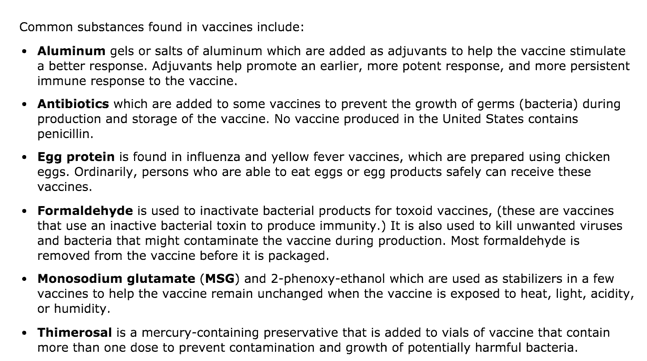
One of the most common vaccines that we all get is the tetanus vaccine.
And it may in fact be the most successful.
It has few side effects, and it does seem to protect us against tetanus.
But what the heck is tetanus?
Tetanus is an infection that causes severe muscle spasms.
The infection usually begins with the jaw, which is why the disease is often called “lockjaw.”
Ever wonder how they make the vaccine that protects us from this infection?
Tetanus vaccines are based on inactivated tetanus toxin. Toxigenic strains of C. tetani are grown in liquid media.
The toxin is purified, and then inactivated by treatment with formaldehyde to produce the toxoid antigen.
After purification and sterilization, tetanus toxoid is formulated with aluminum or calcium salts and administered by intramuscular injection.
So they gather what they think is tetanus bacteria.
They grow it in a medium such as milk protein.
And they purify it with a centrifuge.
Then they detoxify it by exposing it to formaldehyde.
And then they put it in a syringe and put it in your arm.
As vaccines go, tetanus is fairly safe.
The worst vaccines in terms of danger are the virus vaccines.
They’re more dangerous because nobody really knows what’s in them.
There is no way to be sure that the virus they’re looking for is in the culture.
Another thing that makes them dangerous is that they require so many adjuvants in order to be active.
An adjuvant is a compound that is used to modify the effect of another compound or virus.
They’re most often used in vaccines to help make them more effective, to stabalize them, or to extend their usefulness.
People can have reactions to some or all of the adjuvants in a vaccine.
And some adjuvants are toxic if a person gets too much in their system.
Here is a list of what’s in most vaccines.
 Many vaccines contain formaldehyde and mercury among other things.
Many vaccines contain formaldehyde and mercury among other things.
At least tetanus only contains formaldehyde, which although toxic, probably isn’t going to kill you.
Tetanus is a nasty disease and you want to get the vaccine.
The tetanus bacteria are found in soil, especially in warmer areas.
And tetanus is also found in the gut.
It’s possible that animals and people and their feces cause tetanus to build up and soil.
So if you get cut, and even a tiny amount of this virus gets into the wound, it can cause the disease known as tetanus, or lockjaw.
Now here’s where it gets interesting.
How often do we need to get the vaccine anyway?
They used to say that we needed a tetanus shot every 10 years.
Maybe that was good for the vaccine manufacturers.
But it isn’t true.
Like many things that are taken for granted in medicine, this one was unproven and untested.
Nobody ever determined that 10 years was the proper interval to get a tetanus vaccine.
They pretty much just made it up.
So we finally have some good studies about how often you need a tetanus vaccine.
It turns out we don’t need it very often.
 Tetanus immunity is fairly easy to test.
Tetanus immunity is fairly easy to test.
If you take a blood sample, they can analyze it for the presence of antibodies against tetanus.
If the antibodies are present in your blood, then you will not get tetanus.
Your body will fight it off successfully.
So in the study they tested 546 tetanus antibodies.
And these were all people who had had tetanus vaccinations in the past.
95% of the population will remain protected against tetanus and diphtheria for ≥30 years without requiring further booster vaccination.
So in fact, with both tetanus and diphtheria, it is not likely that you need a vaccine more than once every 30 years.
It’s always better not to get a vaccine if you can help it.
Because with a vaccine comes the possibility of complications in your immune system.
These complications come from both from the contents of the vaccine, and also from your body’s reaction to it.
So this study is really great news.
The study checked antibodies for both tetanus and diphtheria.
Researchers found that if anything, the immunity against diphtheria is even longer lived in the body than it is for tetanus.
So the old recommendation to get a tetanus ended theory a shot every 10 years is wrong.
It’s not likely that you need to get one of these more than a couple of times in your life.
Citations
Tetanus
http://www.who.int/biologicals/vaccines/tetanus/en/
Recommendations to assure the quality, safety and efficacy
of tetanus vaccines (adsorbed)
http://www.who.int/biologicals/vaccines/Tetanus_Recommendations_TRS_980_Annex_5.pdf?ua=1
Ingredients of Vaccines – Fact Sheet
http://www.cdc.gov/vaccines/vac-gen/additives.htm
Durability of Vaccine-Induced Immunity Against Tetanus and Diphtheria Toxins: A Cross-sectional Analysis
https://meta.science/paper/27060790_durability_of_vaccine_induced_immunity_against_tetanus_and_diphtheria_toxins_a_cross_sectional_analysis
Click for more information on Tetanus, for information on Medicine, or for more on effects of Tetanus vaccines.
